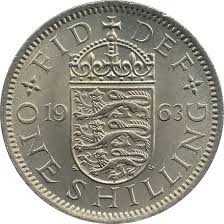记忆方法
1. 音译“先令”,它是英国的旧辅币单位,一英镑 = 20先令,1先令 = 12便士。1971年英国货币改革时被废除。
中文词源
shilling 先令
来自古英语 scilling,先令,货币单位,来自 Proto-Germanic*skillingoz,先令,可能来自 PIE*skel, 切,劈,割,词源同 shale,scale.词义由切引申为铸造,最后用于货币单位,词义演变比较 coin,shekel,pound.
英语词源
- shilling
-
shilling: [OE] Shilling has relatives in the other Germanic languages – German schilling, Dutch schelling, and Swedish and Danish skilling – which point back to a prehistoric Germanic *skillinggaz. Where this came from, however, is a mystery. Among suggestions are that it was formed from the base *skel- ‘divide, separate’ (source of English scale, shell, etc), and hence denotes etymologically a ‘division’ of a standard unit of weight or currency; or from the base *skell- ‘resound, ring’ (source of Dutch schel ‘shrill’ and German schelle ‘bell’).
- shilling (n.)
- Old English scilling, a coin consisting of a varying number of pence (on the continent, a common scale was 12 pennies to a shilling, 20 shillings to a pound), from Proto-Germanic *skillingoz- (cognates: Old Saxon, Danish, Swedish, Old Frisian, Old High German skilling, Old Norse skillingr, Dutch schelling, German Schilling, Gothic skilliggs).
Some etymologists trace this to the root *skell- "to resound, to ring," and others to the root *(s)kel- (1) "to cut" (perhaps via sense of "shield" from resemblance or as a device on coins; see shield (n.)). The ending may represent the diminutive suffix -ling, or Germanic -ing "fractional part" (compare farthing). Old Church Slavonic skulezi, Polish szeląg, Spanish escalin, French schelling, Italian scellino are loan-words from Germanic.
权威例句
- 1. Shilling has been reborn as an artist.
- 希林以艺术家的身份再次出现。
- 2. He handed each of them a shilling.
- 他给了每人一个先令.
- 3. Boats for hire: one shilling an hour.
- 游船出租: 每小时一先令.
- 4. He gave the boys a shilling apiece.
- 他给男孩子们每人一先令.
- 5. Every penny was hard earned, and every shilling was kept until I had to spend it.
- 每个便士都那么难挣, 对于每个先令,都是到万不得已时才花掉它.

